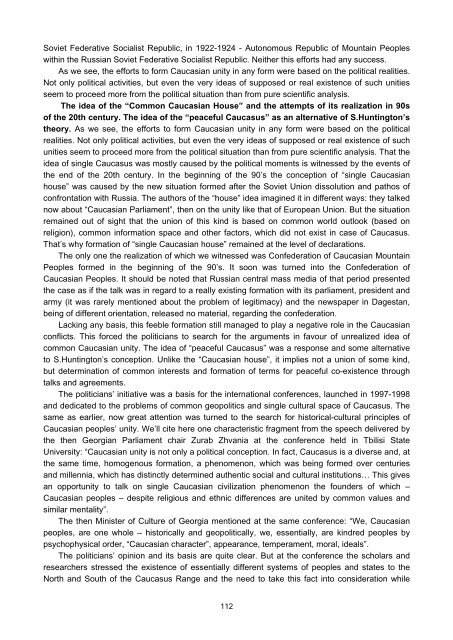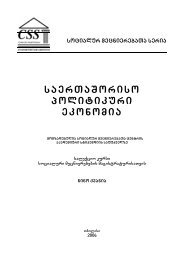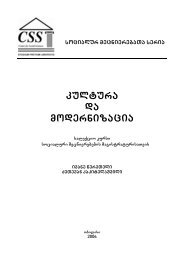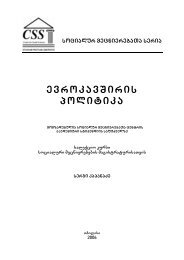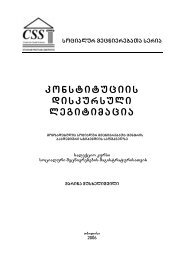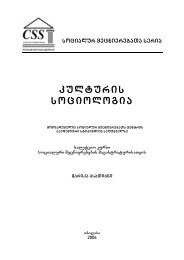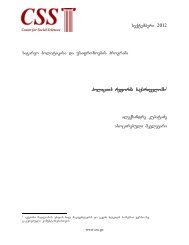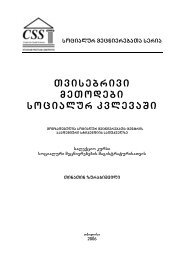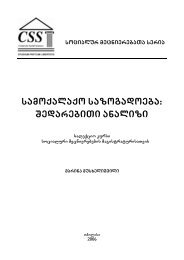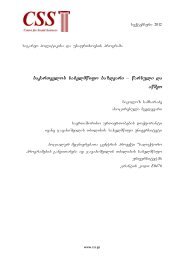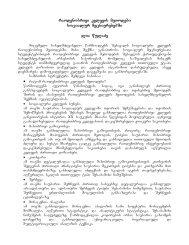kavkasiis geografiuli garemo da mosaxleoba - Center for Social ...
kavkasiis geografiuli garemo da mosaxleoba - Center for Social ...
kavkasiis geografiuli garemo da mosaxleoba - Center for Social ...
Create successful ePaper yourself
Turn your PDF publications into a flip-book with our unique Google optimized e-Paper software.
Soviet Federative <strong>Social</strong>ist Republic, in 1922-1924 - Autonomous Republic of Mountain Peoples<br />
within the Russian Soviet Federative <strong>Social</strong>ist Republic. Neither this ef<strong>for</strong>ts had any success.<br />
As we see, the ef<strong>for</strong>ts to <strong>for</strong>m Caucasian unity in any <strong>for</strong>m were based on the political realities.<br />
Not only political activities, but even the very ideas of supposed or real existence of such unities<br />
seem to proceed more from the political situation than from pure scientific analysis.<br />
The idea of the “Common Caucasian House” and the attempts of its realization in 90s<br />
of the 20th century. The idea of the “peaceful Caucasus” as an alternative of S.Huntington’s<br />
theory. As we see, the ef<strong>for</strong>ts to <strong>for</strong>m Caucasian unity in any <strong>for</strong>m were based on the political<br />
realities. Not only political activities, but even the very ideas of supposed or real existence of such<br />
unities seem to proceed more from the political situation than from pure scientific analysis. That the<br />
idea of single Caucasus was mostly caused by the political moments is witnessed by the events of<br />
the end of the 20th century. In the beginning of the 90’s the conception of “single Caucasian<br />
house” was caused by the new situation <strong>for</strong>med after the Soviet Union dissolution and pathos of<br />
confrontation with Russia. The authors of the “house” idea imagined it in different ways: they talked<br />
now about “Caucasian Parliament”, then on the unity like that of European Union. But the situation<br />
remained out of sight that the union of this kind is based on common world outlook (based on<br />
religion), common in<strong>for</strong>mation space and other factors, which did not exist in case of Caucasus.<br />
That’s why <strong>for</strong>mation of “single Caucasian house” remained at the level of declarations.<br />
The only one the realization of which we witnessed was Confederation of Caucasian Mountain<br />
Peoples <strong>for</strong>med in the beginning of the 90’s. It soon was turned into the Confederation of<br />
Caucasian Peoples. It should be noted that Russian central mass media of that period presented<br />
the case as if the talk was in regard to a really existing <strong>for</strong>mation with its parliament, president and<br />
army (it was rarely mentioned about the problem of legitimacy) and the newspaper in Dagestan,<br />
being of different orientation, released no material, regarding the confederation.<br />
Lacking any basis, this feeble <strong>for</strong>mation still managed to play a negative role in the Caucasian<br />
conflicts. This <strong>for</strong>ced the politicians to search <strong>for</strong> the arguments in favour of unrealized idea of<br />
common Caucasian unity. The idea of “peaceful Caucasus” was a response and some alternative<br />
to S.Huntington’s conception. Unlike the “Caucasian house”, it implies not a union of some kind,<br />
but determination of common interests and <strong>for</strong>mation of terms <strong>for</strong> peaceful co-existence through<br />
talks and agreements.<br />
The politicians’ initiative was a basis <strong>for</strong> the international conferences, launched in 1997-1998<br />
and dedicated to the problems of common geopolitics and single cultural space of Caucasus. The<br />
same as earlier, now great attention was turned to the search <strong>for</strong> historical-cultural principles of<br />
Caucasian peoples’ unity. We’ll cite here one characteristic fragment from the speech delivered by<br />
the then Georgian Parliament chair Zurab Zhvania at the conference held in Tbilisi State<br />
University: “Caucasian unity is not only a political conception. In fact, Caucasus is a diverse and, at<br />
the same time, homogenous <strong>for</strong>mation, a phenomenon, which was being <strong>for</strong>med over centuries<br />
and millennia, which has distinctly determined authentic social and cultural institutions… This gives<br />
an opportunity to talk on single Caucasian civilization phenomenon the founders of which –<br />
Caucasian peoples – despite religious and ethnic differences are united by common values and<br />
similar mentality”.<br />
The then Minister of Culture of Georgia mentioned at the same conference: “We, Caucasian<br />
peoples, are one whole – historically and geopolitically, we, essentially, are kindred peoples by<br />
psychophysical order, “Caucasian character”, appearance, temperament, moral, ideals”.<br />
The politicians’ opinion and its basis are quite clear. But at the conference the scholars and<br />
researchers stressed the existence of essentially different systems of peoples and states to the<br />
North and South of the Caucasus Range and the need to take this fact into consideration while<br />
112


